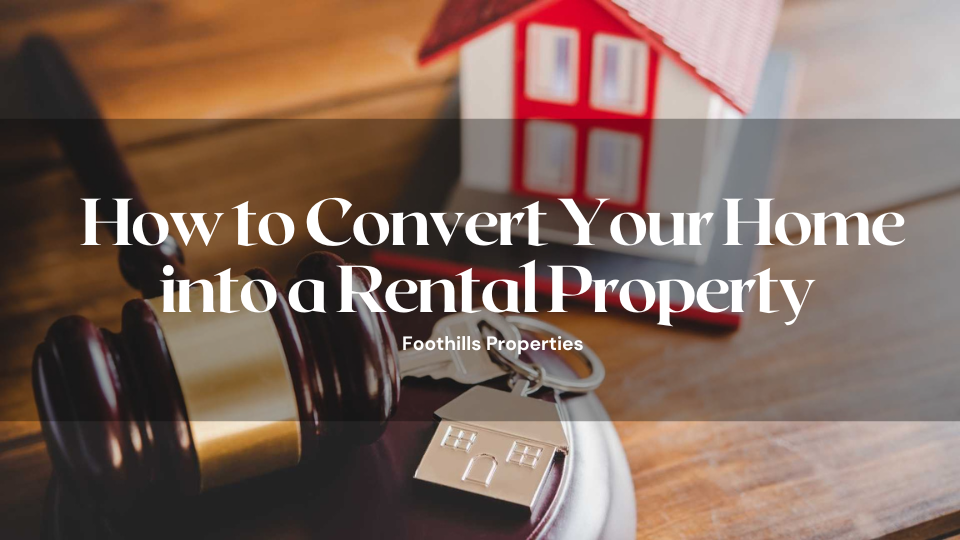
Turning your home into a rental property can be a lucrative way to generate income, but it requires careful planning and execution.
Whether you’re moving to a new city, looking for a new investment opportunity, or simply want to make the most of your current property, converting your home into a rental property can be a smart move.
Essential Steps to Successfully Transition Your Home into a Rental Property
1. Assess Your Property’s Rental Potential
It's crucial to assess whether your property is suitable for rental by considering factors such as location, size, condition, and amenities.
A property in a desirable location with good schools, public transportation, and low crime rates will attract more tenants.
Key Points to Consider:
Market Research: Investigate rental prices in your area to gauge potential income.
Condition of Property: Make necessary repairs and updates to enhance appeal and functionality.
Local Demand: Assess the demand for rental properties in your area.
2. Understand Local Laws and Regulations
Landlord-tenant laws and regulations vary by location, so it's essential to familiarize yourself with the legal requirements in your area.
These regulations cover everything from lease agreements to security deposits and eviction procedures. Research local zoning laws to ensure your property is compliant and check for any required permits or licenses.
Steps to Take:
Research: Review local landlord-tenant laws and regulations.
Consult a Lawyer: Consider seeking legal advice to ensure compliance.
Obtain Permits: Apply for any necessary permits or licenses.

3. Prepare Your Property
Preparing your property for rental involves making it attractive and functional for potential tenants. This includes both cosmetic and practical improvements.
Essential Preparations:
Clean and Repair: Thoroughly clean the property and address any maintenance issues.
Upgrade Features: Consider upgrading appliances, fixtures, and flooring if necessary.
Enhance Curb Appeal: Improve the exterior of your property to make a good first impression.
4. Set a Competitive Rental Price
Setting the right rental price is crucial for attracting tenants while ensuring you cover your costs and make a profit. Overpricing can lead to vacancies, while underpricing might not meet your financial goals.
How to Determine Rent:
Market Comparison: Compare rental rates for similar properties in your area.
Calculate Costs: Factor in mortgage payments, property taxes, insurance, and maintenance expenses.
Adjust for Features: Consider the unique features and amenities of your property.
5. Create a Rental Agreement
A well-drafted rental agreement is vital for protecting both you and your tenants. This document outlines the terms and conditions of the rental, including rent amount, payment due dates, and responsibilities of both parties.
Key Elements of a Rental Agreement:
Lease Duration: Specify the length of the lease (e.g., 12 months).
Rent Terms: Detail the rent amount, payment method, and due date.
Security Deposit: State the amount and conditions for its return.
Maintenance Responsibilities: Define who is responsible for maintenance and repairs.
Rules and Regulations: Include any property rules, such as pet policies or noise restrictions.

6. Market Your Property
Once your property is ready and the rental agreement is prepared, it’s time to find tenants. Effective marketing strategies will help you reach potential renters and fill vacancies quickly.
Marketing Tips:
Online Listings: Use real estate websites and rental platforms to advertise your property.
Social Media: Leverage social media to spread the word.
Local Advertising: Place ads in local newspapers or community boards.
Professional Photos: Invest in high-quality photos to showcase your property.
7. Screen Potential Tenants
Proper tenant screening is crucial for finding reliable and responsible renters. A thorough screening process helps ensure you choose tenants who will pay rent on time and take care of your property.
Screening Process:
Application Form: Require potential tenants to complete a detailed application form.
Credit Check: Review credit history to assess financial responsibility.
Background Check: Conduct background checks for criminal history.
References: Contact previous landlords or employers for references.
8. Prepare for Move-In
Once you’ve selected a tenant, prepare for their move-in. This includes conducting a final walkthrough, addressing any last-minute repairs, and ensuring the property is clean and ready.
Move-In Checklist:
Walkthrough: Perform a final inspection and document the property's condition.
Keys: Provide the tenant with keys and any necessary access codes.
Utilities: Ensure utilities are set up and functioning.
9. Manage Your Property Effectively
Effective property management is essential for maintaining your rental property and ensuring a positive experience for your tenants. This includes handling maintenance requests, managing rent collections, and addressing tenant concerns.

Management Tips:
Regular Maintenance: Schedule routine maintenance and address repair issues promptly.
Rent Collection: Implement a system for collecting rent and managing finances.
Tenant Communication: Maintain open lines of communication with your tenants.
10. Work with a Professional Property Management Company
While managing a rental property on your own is possible, working with a professional property management company can offer several benefits. These companies handle various aspects of property management, allowing you to focus on other priorities.
Advantages of Professional Property Management:
Expertise and Experience: Property management companies have expertise in handling rental properties, including legal requirements, tenant screening, and maintenance.
Time Savings: They manage day-to-day operations, saving you time and effort.
Efficient Rent Collection: They ensure timely rent collection and handle late payments.
Maintenance and Repairs: They coordinate and oversee maintenance and repairs, ensuring issues are addressed promptly.
Tenant Relations: They handle tenant inquiries, complaints, and disputes, providing a professional touch to tenant interactions.
Conclusion
Converting your home into a rental property can be a rewarding venture if approached with careful planning and consideration. By following the tips provided above, you can maximize your rental income and minimize challenges.
Partnering with a professional property management company can further enhance your rental business. Reliable property managers offer expertise and convenience that can lead to greater success and less stress.
To help set you on the path to a successful rental property venture, consider partnering with Foothills Properties. Call us now and we’ll help take your investment to new heights!








